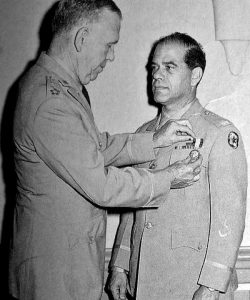On May 27, 1942, the first of seven documentary films, Prelude to War, was released. This documentary series, Why We Fight, was commissioned by the United States Army. In a letter to President Roosevelt, General Marshall states the films would “replace the series of lectures given newly inducted soldiers as to why we are in the war.”
These films were directed by Frank Capra, who had reenlisted in the Army shortly after the attack on Pearl Harbor. Capra, after serving in World War I, had earned fame with movies such as It Happened One Night and Mr. Smith Goes to Washington. He served as a major in the Signal Corps from 1942-1945, during which time General Marshall assigned him to work directly for him to create films. Capra, after seeing the German film Triumph of the Will, was inspired to create a film that stood in direct response to the Nazi propaganda. His first film, Prelude to War, won the Oscar for best documentary film of 1942 as well as the 1944 New York Film Critics Award for Best Documentary Series.
 But some were convinced that the movie was itself propaganda for the Roosevelt presidential administration. Senator Rufus C. Holman, a Republican from Oregon, sat on the Senate Committee on Appropriations and had seen the film on February 11, 1943. “At the conclusion of the picture,” Holman told the Senate, “I was convinced that Mr. Roosevelt intended to seek a fourth term in the Presidency. I was of the opinion that references to war, oppression, combat, and so forth, as they appeared in the picture are only window dressing and stage scenery for cleverly organized campaign material.” On February 8 Holman introduced Senate Resolution 95, which called for an investigation of the preparation and distribution by government agencies of motion pictures, magazines, and periodicals in order to determine what authorization justified these activities, what appropriations financed them, their “underlying purpose,” and “the persons to whom such propaganda is disseminated.” (Congressional Record, 78th Cong., 1st sess., vol. 89, pt. 1: 674.) The resolution was sent to the Committee on Appropriations, which took no action. General Marshall responded in a letter dated February 9, 1943, stating that he “personally found the lectures of officers to the men, as to what we were fighting for and what the enemy had done, so unsatisfactory because of the mediocrity of presentation that I directed the preparation of this series of films. Further, that the President, Mr. Roosevelt, had never heard of their preparation, because this was a matter of Army training responsibility, until after ‘A Prelude to War’ had been shown to probably a million troops.”
But some were convinced that the movie was itself propaganda for the Roosevelt presidential administration. Senator Rufus C. Holman, a Republican from Oregon, sat on the Senate Committee on Appropriations and had seen the film on February 11, 1943. “At the conclusion of the picture,” Holman told the Senate, “I was convinced that Mr. Roosevelt intended to seek a fourth term in the Presidency. I was of the opinion that references to war, oppression, combat, and so forth, as they appeared in the picture are only window dressing and stage scenery for cleverly organized campaign material.” On February 8 Holman introduced Senate Resolution 95, which called for an investigation of the preparation and distribution by government agencies of motion pictures, magazines, and periodicals in order to determine what authorization justified these activities, what appropriations financed them, their “underlying purpose,” and “the persons to whom such propaganda is disseminated.” (Congressional Record, 78th Cong., 1st sess., vol. 89, pt. 1: 674.) The resolution was sent to the Committee on Appropriations, which took no action. General Marshall responded in a letter dated February 9, 1943, stating that he “personally found the lectures of officers to the men, as to what we were fighting for and what the enemy had done, so unsatisfactory because of the mediocrity of presentation that I directed the preparation of this series of films. Further, that the President, Mr. Roosevelt, had never heard of their preparation, because this was a matter of Army training responsibility, until after ‘A Prelude to War’ had been shown to probably a million troops.”
Prelude to War was followed by six other movies. The Nazis Strike (1943), Divide and Conquer (1943), The Battle of Britain (1943), The Battle of Russia (1943), The Battle of China (1944) and War Comes to America (1945). Capra also created other films for the Army, such as The Negro Soldier (1944) and Two Down, One to Go (1945), which featured General Marshall. For his contributions to the war effort, Capra earned the Distinguished Service Medal in 1945.
Watch Prelude to War
